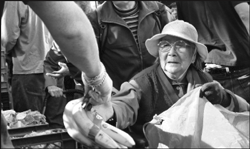By George Cohen
I begin every day, weather permitting, in Tompkins Square Park, reading The New York Times, keeping my audio journal current, conversing with the regulars, meeting new people, feeding peanuts to the squirrels, getting my head together and just “watching the wheels go ’round,” as John Lennon sang a long time ago. I’m a professional photographer, recently retired from a 25-year day job.
Recently, as I sat opposite the park’s ancient, “sacred” Hare Krishna American elm tree, I glanced toward Avenue A and saw a line of more than 100 people. I had passed by similar lines many times before, and I knew they were waiting for the Bowery Mission van to arrive and give out free food.
I had often wanted to takes photos of them but I was always concerned that I might appear to be exploiting their condition or invading their privacy. I knew from years of experience that if I had asked everyone on the line and all the volunteers for permission — or made some kind of announcement stating what I was going to do and why — I would disrupt the whole process and not get any shots.
That morning, my fear melted away. In my mind I heard Marvin Gaye singing his masterpiece, “What’s Going On?” — music has always inspired me — and I summoned up the courage to document hungry folks accepting the largess of their fellow New Yorkers.
As I arrived on Avenue A at St. Mark’s Place, I saw the Bowery Mission’s young outreach expert, Efrain Ramos, gather his volunteers into a circle and lead them in a prayer, their hands joined in the center. After I discretly photographed them praying, my own hand fell easily onto theirs — I joined the prayer circle — and I was then able to focus on my feelings of empathy.
I then introduced myself to Mr. Ramos, and asked his permission to shoot. With my newfound approach of how to fit in, I was able to spend the next hour and a half confidently working without receiving one negative response. Everyone was focused on receiving their food.
The volunteers kept the process moving smoothly until a few people erroneously assumed that there wouldn’t be enough food for all who wanted it. Desperation filled the air and spread quickly. People jostled each other, and some jumped the line. I thought of scenes on TV from impoverished, war-torn Third World nations with the U.N. or N.G.O.’s distributing food to refugees.
Ramos quickly calmed down the group by showing them the interior of the Bowery Mission’s van, which proved that there was clearly enough food for all.
I came away from the experience with so much admiration for the people who could not afford to buy enough food for themselves and their families. When politicians refer to the masses in this country as “the ordinary people,” I say to myself, “Bulls–t!” Those folks waiting on line to feed themselves and their families had the guts, the character, the fortitude, the self-worth and the humility to stand on a public sidewalk in all kinds of weather, being scrutinized by their neighbors, and tolerating a total stranger photographing them.
`

































